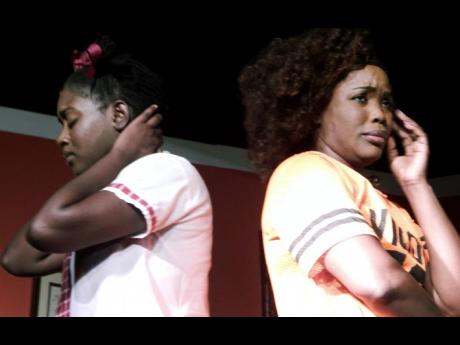'Force ripe' - Child abuse play performed with gusto
True story. It happened at The Theatre Place, Haining Road, on Wednesday afternoon, right after a performance of Force Ripe, a play written, directed and produced by Fabian Barracks.
Addressing what she called "common myths about pregnancy," a National Family Planning Board (NFPB) representative asked, "Have you ever heard that if a girl has sex in the water, she can't get pregnant?"
Her audience, several hundred Meadowbrook High School students, shouted out a confused response and the NFPB rep repeated her question. Again the response was unclear, and again the question was asked.
After the third reply of mixed "Yes's" and No's," the rep declared, "Well, it's a myth." She then moved on to another topic, leaving the Gleaner fervently hoping that every teenager in the audience especially the sexually active ones knew the meaning of the word myth. Otherwise, the NFPB rep's ambiguous phrasing of her question could well lead to unwanted and unintended consequences.
Happily, the message that Barracks was sending to the students via Force Ripe was crystal clear. Child abuse is wrong and must not be tolerated.
The story focuses on the problems of a 15-year-old school girl, Tiffany (Dania Brown), who lives with her mother, Cherry (Belinda Reid). The latter has a gun-toting policeman boyfriend, Mikey (Andre Bennett), who frequently visits the home. Unknown to him, Cherry is also a prostitute.
Tiffany is verbally abused by her mother and physically abused - as in raped - by Mikey. Consequently her home is a very unhappy one, and though she is a bright student and well-liked by teachers and classmates, school can provide no sanctuary for long. She is doing well at school when the play opens, but quickly has to drop out as Cherry refuses to give her money to pay for CXC exams.
Fortunately, Tiffany has a friend outside the home. She is Cora (Dayna Stewart), the owner of a tiny roadside stall nearby. It is because of Cora's help that, after much adversity, Tiffany is able to overcome her problems.
All of Barracks' plays have that general arc. He writes about young people moving from pain and suffering to a happy life.
Every year, for the past five years, he has produced a play twice a year, in May and November.
He used to take a week off from work in those months to stage the plays, but on Wednesday he told this writer that he is now involved in theatre full time.
He has found the secret to making a living from it. He has secured a number of corporate sponsors for his productions and, because of his central characters are young people mostly school children he has been able to bus in hundreds of students from all around the country to his morning shows for schools.
This week, he said, in addition to Wednesday's Meadowbrook students, he had brought in The Queen's High School girls on Tuesday and would bring in Wolmer's and Ardenne High Schools' students on Thursday and Friday. Shows for general audiences are scheduled for several nights in June.
The students love his productions. On Wednesday, they responded enthusiastically to the action on the stage, including the rape scenes; sang along with the dancehall songs played during the blackouts for scene changes, and when asked at the end of the play if they had enjoyed it, they yelled that indeed they had.
While that is good news for Barracks, the drama teachers who always accompany the students should be concerned, especially about what the students studying Literature and Drama take from the production.
It would be tragic if they come to believe that plays like Force Ripe - or Barracks' equally successful offering last year, Bad Apple are of a quality that CXC markers or lecturers in English at colleges and universities think is good.
Not only does Barracks write melodramatic stories, with his characters being caricatures rather than true-to-life, but the actors perform his plays with over-the-top gusto. That includes shouting every line. Presumably, that is how Barracks directs them.
If Barracks or the performers ever go to a drama school, they will have a lot to unlearn. Till then, they will have to become accustomed to being panned by newspaper critics and Actor Boy Award judges.



